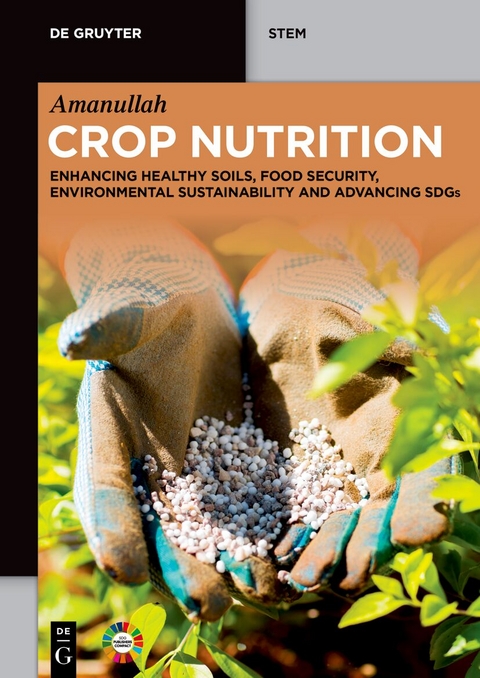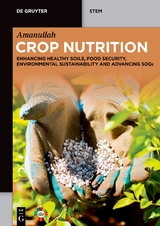Crop Nutrition
In the face of global challenges such as climate change, population growth, and food security, understanding and optimizing crop nutrition has never been more critical. Crop Nutrition addresses these urgent issues by providing an in-depth exploration of how effective nutrient management can enhance soil health, boost food production, and contribute to the achievement of Sustainable Development Goals (SDGs). The book delves into key aspects of crop nutrition, covering the essentials of nutrient management, the role of primary, secondary, and micronutrients, and innovative practices for sustainable agriculture. Each chapter provides comprehensive insights into various nutrients, their functions, and their impact on plant growth and soil health. The text also highlights case studies and success stories from different regions, showcasing practical applications and advancements in crop nutrition. Further, the book emphasizes the importance of integrated nutrient management approaches, such as the use of biofertilizers, nano-fertilizers, and organic amendments. Special attention is given to innovations from the Global South, demonstrating how developing countries are leading the way in sustainable agricultural practices. By integrating scientific research, practical strategies, and global success stories, this book serves as an essential resource for students, researchers, agronomists, policymakers, and agricultural practitioners. It provides the knowledge and tools needed to enhance crop productivity, improve soil health, and ensure sustainable food systems. It not only addresses current agricultural challenges but also paves the way for a resilient and food-secure future, making it a valuable asset for anyone involved in the field of agriculture.
Dr. Amanullah is currently working as Professor in the Department of Agronomy, Faculty of Crop Production Sciences, The University of Agriculture Peshawar, Pakistan. Dr. Amanullah has published/edited more than 26 books/reports, and more than 350 research papers/chapters in peer reviewed journals including more than 130 papers in the impact factor journals.
Dr. Amanullah is the co-author in few books published by UN-FAO e.g. (1): Soil and Pulses: Symbiosis for Life (2016) (2): Unlocking the Potential of Soil Organic Carbon (2017), (3): Soil Pollution: a hidden reality (2018), (4): Measuring and modelling soil carbon stocks and stock changes in livestock production systems - Guidelines for assessment (2019), and (5): Water use of livestock production systems and supply chains - Guidelines for assessment (2020), etc.
Dr. Amanullah is the co-author of a chapter on the assessment report of The Intergovernmental Science-Policy Platform on Biodiversity and Ecosystem Services (IPBES) on land degradation and restoration (2018). Dr. Amanullah worked as review editor of The United Nations' Intergovernmental Panel on Climate Change's (IPCC) Special Report on Climate Change and Land (SRCCL), also known as the "Special Report on climate change, desertification, land degradation, sustainable land management, food security, and greenhouse gas fluxes in terrestrial ecosystems (2019).
Dr. Amanullah also edited few books with Intech Open e.g.: (1): Rice - Technology and Production (2017), (2): Nitrogen in Agriculture-Updates (2018), (3): Corn: Production and Human Health in Changing Climate (2018), (4): Agronomy - Climate Change & Food Security (2020), etc., and a recent book with MDPI-Agriculture on Fertilizer Use, Soil Health and Agricultural Sustainability (2022).
Dr. Amanullah has been awarded with three Research Productivity Awards by the Pakistan Council for Science and Technology (PCST), Islamabad in 2011-12, 2012-13, and 2015-16. Dr. Amanullah represented Pakistan in the FAO Intergovernmental Technical Panel on Soil (ITPS) in the Global Soil Partnership (2015-2018).
Some of Dr. Amanullah field of interests includes: Agronomy, Field Crops Production, Crop Physiology & Growth Analysis, Inter-Cropping & Plants Competition, Biodiversity, Climate Change, Food Security, GHGs Estimation in Field Crops, Crop Nutrition, Fertilizer and Water Use Efficiency, Dryland Agriculture & Drought, Organic Farming, Crops Management under Stressful Environments, Sustainable Crop Production, Sustainable Soil and Water Management, and Farmers training etc.
| Erscheinungsdatum | 07.11.2024 |
|---|---|
| Reihe/Serie | De Gruyter STEM |
| Zusatzinfo | 1 b/w and 33 col. ill., 44 b/w and 1 col. tbl. |
| Verlagsort | Berlin/Boston |
| Sprache | englisch |
| Maße | 170 x 240 mm |
| Gewicht | 662 g |
| Themenwelt | Naturwissenschaften ► Biologie ► Botanik |
| Technik | |
| Schlagworte | Agronomy • biodiversity • climate change • crop production • Entwicklung • Food Production Systems. • Nachhaltigkeit • Soil Management • sustainable agriculture • Umwelt • Weltgesundheit |
| ISBN-10 | 3-11-161709-2 / 3111617092 |
| ISBN-13 | 978-3-11-161709-1 / 9783111617091 |
| Zustand | Neuware |
| Informationen gemäß Produktsicherheitsverordnung (GPSR) | |
| Haben Sie eine Frage zum Produkt? |
aus dem Bereich




